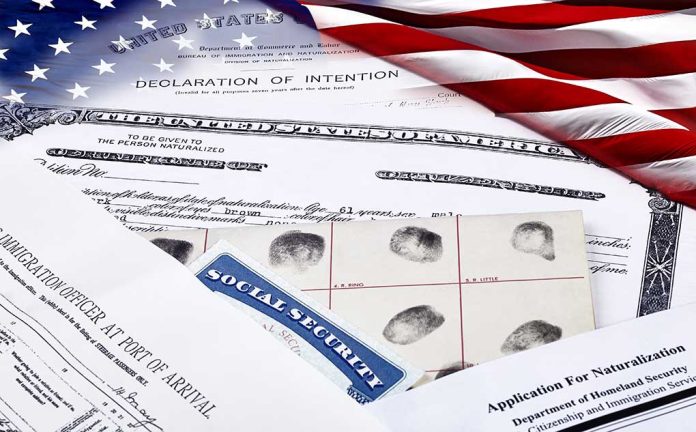
President Trump’s executive order to end birthright citizenship for children of certain migrants sparks nationwide debate and reveals deep political divisions.
Key Takeaways
- President Trump issued an executive order on January 20, 2025, to end birthright citizenship for children of certain migrants.
- A new Emerson College poll shows 45% of Americans support the order, while 37% oppose it.
- Support for the order is highest among Republicans (69%) and in the Southern United States (51%).
- The order does not affect citizenship rights of children born to lawful permanent residents.
- The move has sparked debates about constitutional interpretation and immigration policy.
Executive Order Details
On January 20, 2025, President Donald Trump issued an executive order aimed at redefining birthright citizenship in the United States. The order emphasizes that U.S. citizenship is a “profound gift” and should not be automatically granted to children born to mothers unlawfully present in the country or those with temporary legal status if the father is not a U.S. citizen or lawful permanent resident.
The order directs government agencies to stop issuing or accepting citizenship documents for individuals falling into these categories. It applies to births occurring 30 days after the order’s issuance and does not affect children of lawful permanent residents. The Secretaries of State, Attorney General, Homeland Security, and Social Security Commissioner are tasked with ensuring compliance.
Public Opinion Divided
A recent Emerson College poll reveals that public opinion on this issue is significantly divided, often along party lines. The survey of 1,000 registered U.S. voters shows that 45% support Trump’s effort to roll back birthright citizenship, while 37% oppose it, and 19% remain neutral or undecided.
Support for ending birthright citizenship is highest among Republicans at 69%, with some support from Democrats (25%) and independents (38%). Regionally, the South shows the strongest support at 51%. Interestingly, while Latino respondents are the most opposed (42%), they also show significant support (39%).
Americans support Trump’s birthright citizenship rollback, new poll reveals https://t.co/pzmcrH1t5e
— Independent US (@IndyUSA) January 30, 2025
Constitutional Debate
The executive order has reignited debates about the interpretation of the 14th Amendment, which states “All persons born or naturalized in the United States, and subject to the jurisdiction thereof, are citizens of the United States and of the State wherein they reside.”
Supporters of the order argue that the phrase “subject to the jurisdiction thereof” allows for some discretion in granting citizenship, while opponents contend that the amendment guarantees citizenship to all born on U.S. soil, regardless of their parents’ status.
Broader Immigration Sentiment
The Emerson College poll also revealed broader sentiments on immigration issues. A majority of Americans (56%) support a pathway to citizenship for undocumented migrants. However, opinions are split on allowing Immigration and Customs Enforcement (ICE) to conduct searches in schools and churches, with 44% against and 41% in favor.
The poll indicates a slight increase in optimism among the American public following Trump’s inauguration, with 52% believing the country is on the right track. President Trump’s job approval rating stands at a net positive of +8%, with 49% approving and 41% disapproving of his performance.
As the debate over birthright citizenship continues, it’s clear that this issue remains a contentious point in American politics, reflecting deeper divisions on immigration policy and constitutional interpretation.









